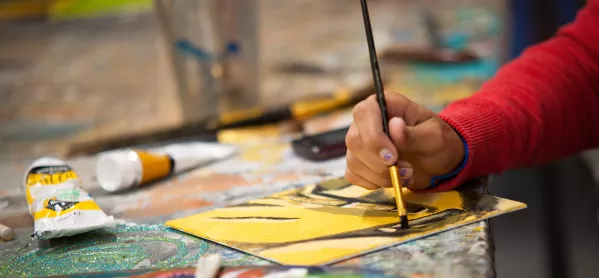More than a third of pupils say that school is the only opportunity that they have to engage in arts activities, according to a recent survey.
As arts and cultural provision in schools continues to decline, thousands of young people and teachers have expressed their concerns in a landmark survey commissioned by Arts Council England.
The study, Time to Listen, undertaken by the School of Education at the University of Nottingham, the Royal Shakespeare Company (RSC) and the Tate art gallery gathered responses from 6,000 students aged 14 to 18 and their teachers over three years.
Students who took part in the survey said that studying arts and culture subjects helped them to build self-belief and confidence, take risks, develop empathy and tolerance, and appreciate diversity. They also said that arts and culture provided an important release amidst growing pressure at school.
And yet, despite these benefits, arts and cultural opportunities in education are suffering as core subjects take over. Tes analysis revealed that English, maths and science now make up more than half of lesson time for 14- to 16-year-olds. We revealed that the latest figures for 2017 show that at key stage 3, less time is being spent teaching music (down by 11 per cent), art (down by 9 per cent) and drama (down by 7 per cent), compared with 2011. While at key stage 4, music is down 12 per cent, art is down 20 per cent and drama is down 26 per cent.
Arts ‘must be at the core of education’
Maria Balshaw, director of Tate, said: “We cannot overstate the case for an arts and cultural education for all. Arts subjects must be at the core of education provision in the UK in our schools, be they state-funded or independent, and in our universities.
“We must listen to the reverberating sound of the 6,000 voices that are part of this important piece of research and act now. Otherwise, we will be failing the children and students who are the creative future of the UK.”
RSC’s director of education, Jacqui O’Hanlon, told Tes that schools have an essential role in brokering arts experiences.
“As the opportunity gap between students at state-funded and independent schools continues to grow, this also becomes a matter of social justice. Without access to art and culture at school, large numbers of children will miss out on this chance to broaden their horizons, see themselves and the world in new ways and explore who they are and what they might become,” she said.
Following the findings, the RSC and Tate are calling for five changes to support schools and ensure that arts and culture education features in all young people’s education:
- All secondary schools should be able to:
a) ensure that at keys stage 3 the arts have parity with other subjects;
b) offer a full range of arts subjects at key stage 4;
c) confidently talk to students and their families about the value of studying arts subjects.
- The Ofsted process should ensure the breadth and balance of the school curriculum by specifying in the inspection framework the minimum proportion of curriculum time to be spent studying arts subjects at KS3, and the range of arts subjects which should be offered at KS4.
- There should be an Arts and Culture Premium for all children in schools.
- Russell Group universities should review their approach to “facilitating subjects” - those subjects favoured in university applications - recognising that studying arts subjects can provide young people with an essential foundation for further study.
- There should be acknowledgement and appropriate reward in both pay scale and job title for the work of teachers who take on the role of “arts broker”.





